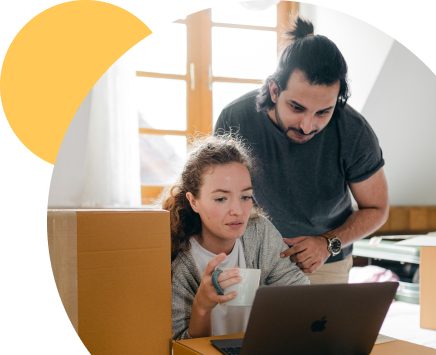Many of us dream about homeownership, but buying a house can seem out of reach. After all, a down payment can be tens of thousands of dollars, and that’s a barrier for many first-time homebuyers.
It doesn’t have to be. Plenty of people become homeowners with zero-down mortgages. While this is an entryway for many, it comes with its own set of considerations. Let's look at how to buy a house with no money down and how to know if it’s a good option for you.
What is a zero-down mortgage?
A zero-down mortgage is simply a home loan that doesn’t require a down payment. Most mortgages require you to make a down payment at closing. When you get a no-down payment mortgage, you essentially finance the entire house and only pay traditional closing costs, such as attorney fees and taxes. This makes owning a house more affordable.
No-money-down mortgage programs
There are two programs for first-time homebuyers where you can actually buy a home without making a down payment. Both programs are backed by federal funds to reduce the risk to lenders and encourage new purchases:
- US Department of Veterans Affairs (VA) home loans: VA loans are reserved for active-duty service members, members of the National Guard, and veterans or their spouses, and eligibility depends on the applicant’s time in the military. The VA does not set a minimum credit score, but the lenders who make the loans may.
- US Department of Agriculture (USDA) home loans: USDA loans are designed to encourage property ownership in designated rural and suburban areas. In addition to having a home in one of these locations, you also have to meet certain financial requirements including a credit score of at least 640 and a combined household income that is less than 115 percent of the median income of the area.
Alternatives to no-money-down programs
The programs for a no-money-down mortgage are pretty limited, but they aren’t your only option if you’re struggling to put the funds together for a down payment. If you have some cash available, you might try a:
- Federal Housing Administration (FHA) home loan: Depending on your credit score, you may be able to get an FHA loan for as little as 3.5 percent down.
- Conventional home loan: You may be able to get a Fannie Mae or Freddie Mac loan that only requires a 3 percent down payment. However, these loans typically have higher credit score requirements.
- Piggyback loan: Also called an 80/10/10 loan, a piggyback loan lets you get two mortgages at the same time. The first is for 80 percent of the purchase price, and then you piggyback a second loan on top of that for another 10 percent, leaving only 10 percent required for a down payment. This loan usually requires a higher credit score.
- Mortgage assumption: Eric Nerhood of Premier Property Buyers explains that this is when “the buyer takes over the payments on the mortgage that the seller already has on the property.” This can get the seller out of a bad situation, while the buyer usually pays them just a nominal fee.
Private mortgage insurance and no-interest loans
There is a tradeoff when you buy a home using a low-interest loan: you’ll have to pay private mortgage insurance (PMI). This insurance protects the lender in case you default on your loan and your property goes into foreclosure. It’s a mechanism that allows lenders to loan money for most, or sometimes all, of the property’s price.
But PMI can be pricey. It typically costs anywhere from 0.5 to 1 percent of your loan amount, and that’s tacked onto your mortgage payment. Moreover, you keep paying it until you reach a minimum of 20 percent equity in the home. Then you can request to have the PMI removed.
To be fair, neither USDA nor VA loans require PMI. However, both can have other fees to consider. The VA charges home buyers a funding fee between 1.4 percent and 3.6 percent of the loan. As for the USDA, it charges both an upfront guarantee fee and an annual fee.
Is a zero-down or low-interest loan right for you?
If you want to buy a home and don’t have money for a down payment, a no-down loan may be good – depending on your situation. According to Jason Gelios, a top-producing realtor with Community Choice Realty, home buyers need to consider their goals and what the market is doing before choosing a mortgage.
“If someone purchases a home and some unforeseen circumstance happens where they have to sell, they may not be able to sell the property for more than what they purchased it for,” says Gelios. “This could spell trouble.”
Ultimately, your particular situation determines what sort of mortgage is right for you. That said, we can offer a few things to think about to help you decide.
Can you afford the interest?
A no-money-down loan may save you money on the front end, but you have to consider what that means over time. Everyone who takes out a loan pays more than the amount they borrow because they have to pay interest. Putting some money down reduces your interest and may actually be less expensive in the long run.
Just because the loan doesn’t require a down payment doesn’t mean that you can’t put some money down. But if you choose this route, you need to be thoughtful about how much to pay. A small percentage down may not have much impact on a 30-year mortgage.
What are your long-term plans?
For the most part, home values go up, and that generally means you’re more likely to see a good return on your investment the longer you stay in your home. But this isn’t a hard-and-fast rule, as anyone who bought a home before the Great Recession can tell you.
Plus, think about how stable your income is. If unforeseen circumstances cause you to have to get out of your loan, you may have to pay a hefty price.
Are you buying a home that needs repairs?
Normal maintenance alone can add up to a significant chunk of change every year, but if you’re looking at a home that needs major repairs, you may want to consider a no-down-payment loan. It can help you preserve your savings so you have a safety net of funds to handle home repairs.
House flipper Alex Capozzolo says that if “you need to pay more than $10,000 on fixing up a house before you can move in, it makes sense to buy it with no money down.” He adds this may be especially true if the house is older and you anticipate more repairs in the future.
The main idea here is to protect your nest egg, and it may apply in a number of scenarios. Just because you have a savings account doesn’t mean you should spend every dime of it on a down payment. You’ll likely need some of it for other expenses.
Before you go for a loan that requires no money down, consider all aspects of your financial situation. A zero-down mortgage can certainly open up buying opportunities for those who qualify and don’t have the means to put a large down payment on the property. But while it makes the entry point easier, it also means higher mortgage payments, more interest paid over the course of the loan, and private mortgage insurance premiums.


